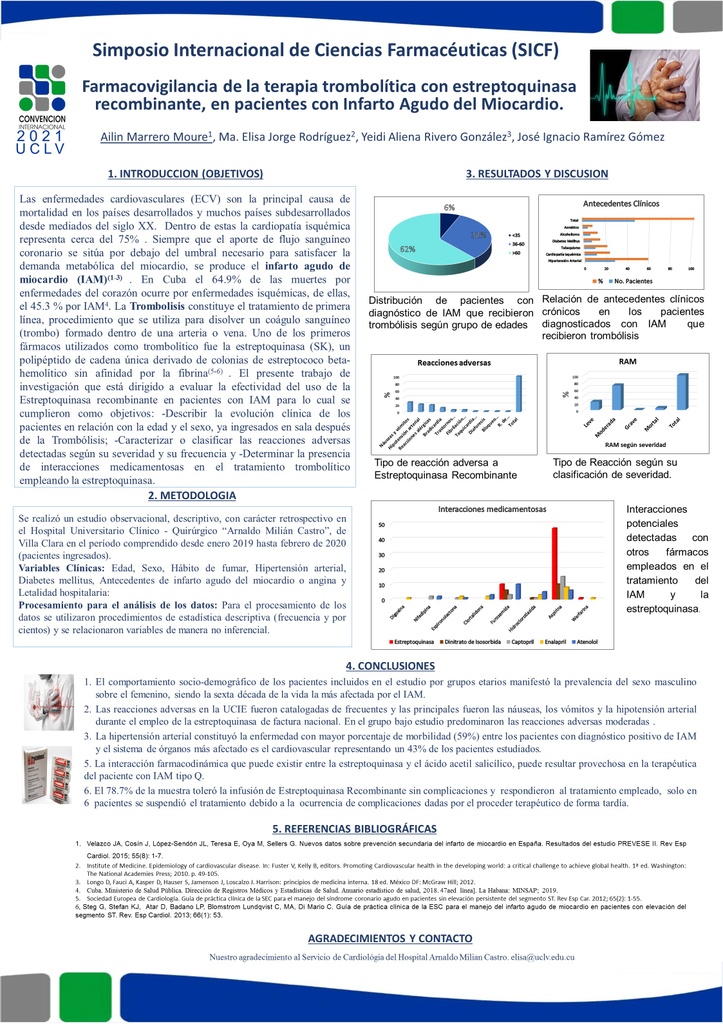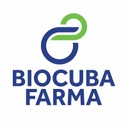Executive Secretary

Simposio Internacional de Ciencias Farmaceúticas
SICF

Abstract
Acute myocardial infarction is undoubtedly a frequent condition that is accompanied by high mortality and is considered the main cause of death in countries with high economic development. Despite advances in diagnosis, the treatment of this disease persists as a serious medical problem in emergency services and progressive care. The present work was focused on the treatment with Recombinant Streptokinase (KS) to patients suffering from this pathology at the “Arnaldo Milián Castro” hospital, in the period from January 2019 to February 2020. The universe was included for 180 patients and the sample consisted of 47 diagnosed patients. As results the male sex presented the highest levels of morbidity and mortality, being the sixth decade of life the most affected by this pathology; arterial hypertension was the disease with the highest morbidity rate (59%). More than half of all thrombolyzed patients presented at least one suspected adverse reaction to medications; nausea, vomiting and severe hypotension were the adverse reactions with the highest incidence in treatment and moderate reactions prevailed in 70% and frequent ones in 66.6%. The most affected system was the cardiovascular with 43%. The state at discharge of the 47 thrombolyzed patients 85% were discharged alive and 14.8% died. The 78.7% of the cases did not present clinical or electrocardiographic complications and the number of patients that evolved positively was statistically higher than those who died. There were only drug interactions with warfarin, furosemide, and Acetyl Salicylic Acid.
Resumen
El infarto agudo de miocardio es indudablemente una afección frecuente que se acompaña de alta mortalidad y está considerada como la principal causa de muerte en los países con alto desarrollo económico. El presente trabajo estuvo centrado en el tratamiento con Estreptoquinasa Recombinante (SK) a pacientes aquejados de esta patología en el hospital “Arnaldo Milián Castro”, de la provincia de Villa Clara, en el período de enero del 2019 a febrero del 2020. El universo abarcó 180 pacientes y la muestra se conformó con 47 pacientes diagnosticados a los que se les aplicó el medicamento. Como resultado el sexo masculino presentó los mayores niveles de morbilidad y mortalidad, siendo la sexta década de la vida la más afectada por esta patología; la hipertensión arterial constituyó la enfermedad con mayor porcentaje de morbilidad (59%). Más de la mitad del total de pacientes trombolizados presentaron al menos una sospecha de reacción adversa a medicamentos donde las náuseas, los vómitos y la hipotensión severa fueron las reacciones adversas de mayor incidencia en el tratamiento. Prevalecieron las reacciones moderadas en el 70% y las frecuentes en el 66.6%. El sistema más afectado fue el cardiovascular con un 43%. De los 47 pacientes trombolizados el 85% egresaron vivos y el 14.8% fallece. El 78.7% de los casos no presentó complicaciones clínicas ni electrocardiográficas y la cantidad de pacientes que evolucionaron de manera positiva fue estadísticamente superior a los que fallecieron. Solo hubo interacciones entre el medicamento con la warfarina, la furosemida y el ácido acetil salicílico.
About The Speaker

Dra. María Elisa Jorge Rodríguez

